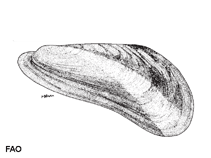Arcuatula arcuatula (Hanley, 1843)
Arcuate mussel| Native range | All suitable habitat | Point map | Year 2050 |

|
| This map was computer-generated and has not yet been reviewed. |
| Arcuatula arcuatula AquaMaps Data sources: GBIF OBIS |
Classification / Names Κοινά ονόματα | Συνώνυμα | CoL | ITIS | WoRMS
Bivalvia | Mytilida | Mytilidae
Environment: milieu / climate zone / εύρος βάθους / distribution range Οικολογία
. Tropical
Distribution Χώρες | Περιοχές FAO | Οικοσυστήματα | Παρουσίες | Εισαγωγές
Indo-West Pacific: from northwest Indian Ocean, including the Red Sea, to Indonesia; north to Vietnam and south to New Caledonia. Exact distribution of this species is not known, because of confusions with other related mytilid species.
Length at first maturity / Μέγεθος / Weight / Age
Γεννητική Ωρίμανση: Lm ? range ? - ? cm Max length : 5.0 cm TL αρσενικό/απροσδιόριστο; (Αναφ. 348); common length : 3.0 cm TL αρσενικό/απροσδιόριστο; (Αναφ. 348); μεγ. αναφερόμενη ηλικία: 2.00 έτη (Αναφ. 8702)
Short description Μορφολογία
Life cycle and mating behavior Γεννητική Ωρίμανση | Αναπαραγωγή | Γεννοβολία | Eggs | Γονιμότητα | Larvae
Main reference
Αναφορές | Συντονιστής | Συνεργάτες
Poutiers, J.M. 1998 Bivalves. Acephala, Lamellibranchia, Pelecypoda. p. 123-362. In Carpenter, K. E. and V. H. Niem. 1998. FAO species identification guide for fishery purposes. The living marine resources of the Western Central Pacific. Volume 1. Seaweeds, corals, bivalves, and gastropods. Rome, FAO. (Αναφ. 348)
IUCN Red List Status
(Αναφ. 130435: Version 2025-1)
CITES status (Αναφ. 108899)
CMS (Αναφ. 116361)
Threat to humans
Human uses
| FishSource |
Εργαλεία
Περισσότερες πληροφορίες
Σύσταση δίαιτας
Κατανάλωση τροφής
Θηρευτές
Διαδικτυακές πηγές
BHL | BOLD Systems | CISTI | DiscoverLife | FAO(Publication : search) | Fishipedia | GenBank (genome, nucleotide) | GloBI | Gomexsi | Google Books | Google Scholar | Google | PubMed | Δέντρο Ζωής | Wikipedia (Go, αναζήτηση) | Zoological Record



